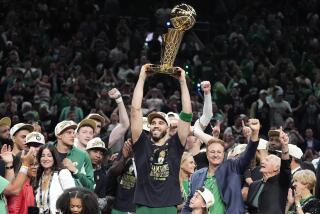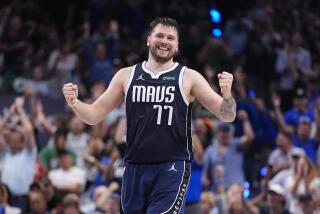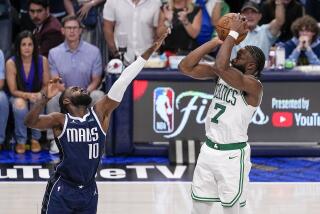Celtics Banking On Playoff Experience
- Share via
In the eyes of their most demanding supporters and harshest critics, the Boston Celtics’ biggest crime, as the new decade began, was that they were no longer the dominating Celtics of the last decade.
In particular, Boston’s fans and press noted, 33-year-old Larry Bird was no longer the 27-year-old Bird, or even the 30-year-old Bird. It was not that he had lost a step, it was that he had lost three or four. And even when he was the 30-year-old Bird, or the 27-year-old Bird, he was not that fast.
During the 1989-90 season, Bird, as always, epitomized the Celtics. Unfortunately, the critics said, he was old and slow and so was the team.
As the first playoffs of the ‘90s get under way, however, the weaknesses that have been associated with the Celtics throughout the regular season suddenly seem like strengths.
Yes, they are old -- Robert Parish is 36, Dennis Johnson is 35, Bird is 33 and Kevin McHale is 32. But age equals experience. Those four combined have played in 608 playoff games. Bird, Parish and McHale have played in five National Basketball Association finals and Johnson has played in seven. Playoff pressure is a fun and familiar part of life for them.
And yes, they are slow. But playoff games are typically slower than regular-season games. Because of their lack of team speed, the Celtics built their 52-30 regular-season record with, perhaps, the best half-court game in the league. And playoff games often are won in the half court.
Because they are slow, the Celtics have to work harder for their shots. Sometimes, they have to shoot far from the basket. But that only makes their performance from the field even more impressive. They have the second best field-goal percentage in the league (.498 behind the Utah Jazz’s .505).
They also know how to work to get the open shot -- they lead the league in assists. And, if an opponent chooses to send them to the free-throw line, the Celtics celebrate -- they set an all-time NBA record by making 83.2 percent of their free throws.
“We’re not built like some of the other teams,” said Celtics Coach Jimmy Rodgers. “But maybe that is to our advantage. We pose some problems that the majority of people don’t pose. If you’re not as quick, you’ve got to do some of the little things. You’ve got to play good defense, and I think we’re pretty solid defensively. You’ve got to shoot well, you’ve got to go to the free-throw line and you’ve got to pass well. And those are the things that we do well.”
The Celtics also are on a roll. They won nine of their last 10 regular-season games and 16 of their last 20.
Their record was ninth-best in the league and fourth-best in the Eastern Conference, but their 22-19 road record was second-best in the East behind the Detroit Pistons and tied for fourth best in the league. They like the road, a trait of successful playoff teams.
They were not as dominant at home as they have been in the past with a 30-11 record, but they have demonstrated an ability to win.
“It’s not like we were in ’86 and ‘87, when we knew that we could play poorly and win games,” McHale said. “We’re not going to do that anymore. But if we’re playing well, we’re going to win games. I’m not saying we’re going to win the championship, but someone’s going to have to play very well to beat us.”
The New York Knicks get the first shot at the Celtics when the two begin their best-of-five first-round series in Boston Garden Thursday night. Bird and Johnson missed the last two games of the regular season -- Bird had an abscess on his buttocks drained and Johnson had a strained right calf, but each will be ready to play Thursday.
Celtic coaches say the team’s strong finish is due to two factors -- improvement of the transition defense and a set playing rotation.
(Optional add end)
“We’ve never been able to run the floor defensively with other teams,” said assistant coach Chris Ford, “but we’re doing a better job. Mainly we’re taking care of the ball better. There was a long time there that for every turnover, it was two points at the other end. You just can’t do that.”
Rodgers experimented with lineups for much of the year, but that ended in late February when Rodgers sent Ed Pinckney, who had started 50 of the first 52 games, to the bench and re-inserted McHale into the starting lineup. Rodgers went to an eight-man rotation with Bird, McHale, Parish, Johnson and Reggie Lewis starting and Joe Kleine, Jim Paxson and John Bagley as the primary reserves.
At about the same time, Bird began playing his best basketball. During a 15-game stretch from Feb. 21 to March 23, Bird averaged 28.5 points, 11.0 rebounds and 7.5 assists while shooting 55 percent from the field. During the first half of the season, Bird had made only 45 percent of his shots, but he finished the season at 47.3.
Bird led the Celtics with a 24.3 scoring average while McHale averaged 20.9, Lewis 17.0 and Parish 15.7. Parish averaged 10.1 rebounds, Bird 9.5 and McHale 8.3.
Lewis was particularly tough against the Knicks, leading the Celtics with a 23.8 average in the six games. Bird had his problems with the Knicks, making only 34.2 percent of his shots and averaged 21.4 points.
But, as is often the case with Bird, when he was not shooting well, he was excelling at other parts of the game. He led the Celtics with an average of 11 rebounds and 8.2 assists against the Knicks.
Last season, without Bird, the Celtics were eliminated by the Pistons in three games in the first round. But he is back, and the Celtics figure to be tougher.
“The playoffs are a physical game,” Kleine said. “The running and gunning is not as much of a factor. It will still be there, but not as much. We have a very physical team. We have veterans. If we get in foul trouble, we have enough people to pull us through. And we have Larry, Kevin and Robert. That’s the main reason that I feel good.”
More to Read
Go beyond the scoreboard
Get the latest on L.A.'s teams in the daily Sports Report newsletter.
You may occasionally receive promotional content from the Los Angeles Times.










